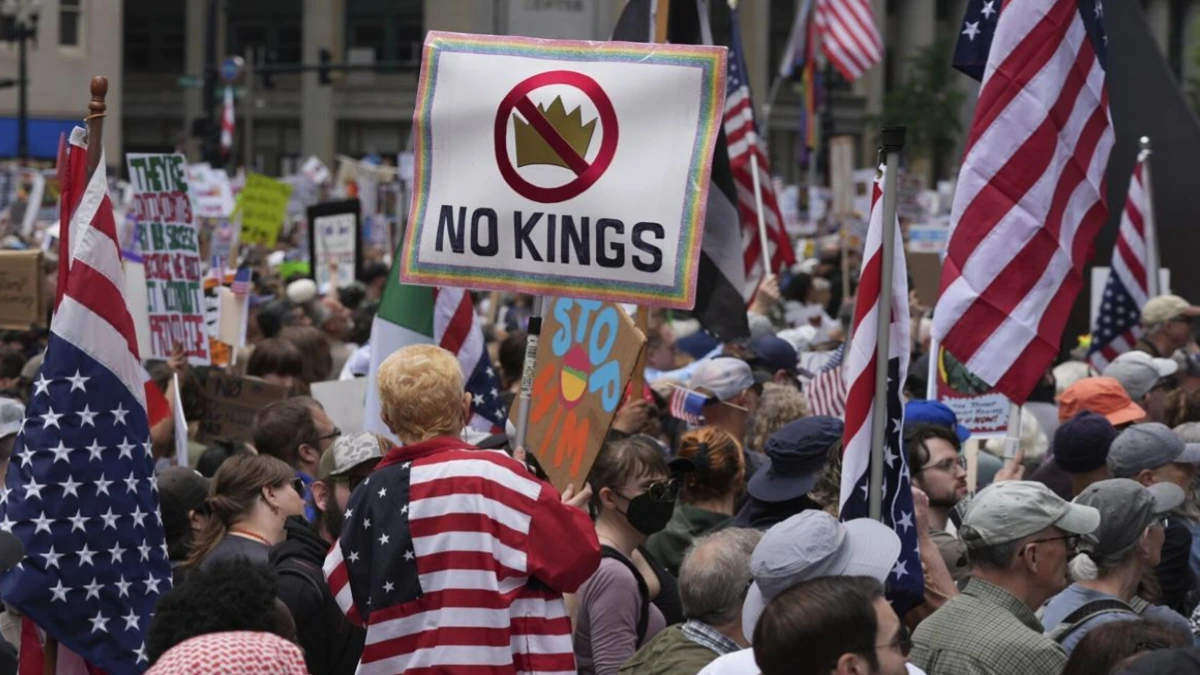WASHINGTON — Demonstrators in cities across the United States are preparing for a wave of No Kings protests Saturday, denouncing what they describe as President Donald Trump’s growing consolidation of executive power and the ongoing government shutdown.
Republicans have branded the movement as “Hate America” rallies, intensifying partisan tensions as the country grapples with its third major wave of demonstrations since Trump’s return to the White House.
The protests, organized in more than 2,600 locations nationwide, come as federal services remain shuttered for an eighteenth day. Organizers say the shutdown has exposed a dangerous imbalance between the presidency and other branches of government.
“This isn’t about left or right it’s about restoring constitutional order,” said Ezra Levin, co founder of Indivisible, one of the lead organizing groups. “When a president treats co equal branches like subordinates, Americans must remind him that we have no kings.”
The “No Kings” protests follow a turbulent period in Washington marked by legislative gridlock, budget disputes, and renewed political polarization. Trump, speaking Friday morning before departing for a fundraising event at his Mar a-Lago estate, dismissed accusations of authoritarianism.
“They say they’re referring to me as a king. I’m not a king,” Trump said in an interview on Fox News, calling the demonstrations “radical theatrics” designed to distract from what he described as “Democrats’ refusal to govern.”
Previous mass demonstrations this year including one opposing Elon Musk’s corporate cuts and another responding to a planned military parade helped galvanize opposition groups that had been fragmented since Trump’s reelection.
Organizers now describe Saturday’s protests as the most coordinated effort yet, uniting progressive coalitions, labor unions, and civil rights advocates under a shared message of accountability.
Political analysts say the protests highlight the broader power struggle between the executive branch and Congress. “Trump’s governing style has always tested institutional limits,” said Dr. Andrea Simmons, a political scientist at Georgetown University.
“The shutdown provides a focal point for public frustration about what many perceive as an erosion of democratic norms.” According to Simmons, the “No Kings” movement echoes earlier democratic movements in American history, from the anti Vietnam protests of the 1970s to the Women’s March of 2017.
However, she noted that labeling by both parties “Hate America” from the GOP and “Save Democracy” from organizers illustrates how deeply partisan framing now dominates political discourse.
Republican leaders have portrayed the rallies as divisive and unpatriotic. “Let’s see who shows up,” House Speaker Mike Johnson said Thursday, calling the gatherings “a parade of antifa types, Marxists, and those who hate capitalism.”
Democratic leaders, including Senate Majority Leader Chuck Schumer and Sen. Bernie Sanders, countered that the demonstrations reflect patriotic dissent.
“This is not a ‘Hate America’ rally it’s a love America rally,” Sanders wrote on social media. “It’s about protecting freedom from authoritarian overreach.”
Organizers report a steady increase in participation since the first “No Kings” event in June, which drew roughly 2,100 registered locations nationwide. Saturday’s rally is expected to surpass 2,600, suggesting growing momentum for the opposition movement.
Polling from the nonpartisan Pew Research Center found that 58 percent of Americans believe the federal government is “too dependent on presidential authority,” while 36 percent view protests as “a legitimate means of restoring balance.”
Meanwhile, the government shutdown has left more than 800,000 federal workers without pay and suspended key services, from small business loans to food safety inspections. Republicans insist that reopening the government should take priority over political demonstrations.
“We can debate the scope of presidential power after people get their paychecks,” said Sen. Lindsey Graham, R S.C. “What Democrats are doing is holding the American people hostage.”
In Philadelphia, where one of the largest “No Kings” rallies is scheduled, residents expressed frustration with the ongoing turmoil.
“I voted for stability, not for this chaos,” said Maria Gutierrez, a retired federal employee. “These protests are about saying that no one not even the president is above the law.”
In Texas, where several Republican lawmakers have denounced the movement, some residents see the rallies differently. “It feels like people are protesting just for the sake of it,” said Austin mechanic Paul Henderson.
“I don’t agree with everything Trump does, but calling this dictatorship talk is too much.” Organizers say such differing opinions underscore the importance of dialogue. “We’re not asking people to agree on every issue,” said Levin. “We’re asking them to agree that democracy matters.”
Analysts predict that Saturday’s demonstrations could shape the tone of political discourse heading into next year’s congressional elections.
“If turnout is strong, it could embolden Democrats to take a firmer stance against Trump’s agenda,” said Marisa Cole, an analyst with the Brookings Institution.
“But if protests appear disorganized or extreme, it risks reinforcing the GOP narrative that this is a movement against America itself.”
Federal security agencies said they expect peaceful gatherings but remain vigilant. “We’re coordinating with local authorities to ensure safety and order,” a Department of Homeland Security official said Friday.
As Americans prepare to gather under banners reading “No Kings,” the protests have come to symbolize more than a single policy dispute. They mark another chapter in the country’s ongoing struggle over power, democracy, and national identity.
Whether the events are remembered as a turning point for civic engagement or as another flashpoint in partisan division, they reflect a nation still reckoning with the limits and the responsibilities of freedom.
